Envision launches another reputation management campaign amid potential contract losses
Under the gun about its reputation for dumping sky-high medical bills on patients for out-of-network care, post-acute care provider Envision Healthcare has launched a second information campaign called “We Care.”
The Nashville, Tennessee-based company is aiming to better inform patients, hospitals and employers about “its commitment to negotiate a contract with UnitedHealthcare.” UnitedHealthcare, one of the nation’s largest healthcare insurance companies, signaled to Envision that it may end its contracts with the provider due to its billing practices.
Billing scrutiny
Envision has received criticism for its billing practices over the last few years. The company also owns emergency department staffing company EmCare, which has come under fire for jacking up out-of-network billing with the hospitals it contracts with. This practice typically leaves patients and insurers with significantly higher bills.
UnitedHealthcare said in September it was considering ending its contracts with Envision since the two could not come to agreements over emergency room payment agreements. UnitedHealthcare warned more than 250 hospitals may drop Envision from their networks beginning in 2019.
Envision has rebutted claims from UnitedHealthcare, though a lawsuit it launched was dismissed. The company also launched a campaign to better inform patients about surprise billing in early October.
“In truth, Envision has offered to hold its rates flat, and those rates are in line with other payors,” an announcement about Envision’s campaign reads. “Currently, more than 90 percent of Envision’s revenue is from in-network care, meaning most patients never receive a ‘surprise bill’ from Envision, as UnitedHealthcare is falsely leading patients to believe.”
A Yale study from 2017 found that EmCare contracts with hospitals had a 62 percent out-of-network billing rate.
We Care campaign
The new campaign is another attempt by Envision to improve its image and “set the record straight” about its priority of caring for patients and to negotiate contracts with UnitedHealthcare.
The current partnership between the two companies will end Dec. 31, 2018. Envision stated it has been working with UnitedHealthcare “in good faith” since January to come up with a new agreement.
“UnitedHealthcare cannot push Envision out-of-network,” an announcement about the campaign reads. “The two must work together to make sure patients continue to receive quality care and in-network coverage.”
Envision’s campaign encourages healthcare providers to “voice their concerns” if the company were to be dropped by UnitedHealthcare.

